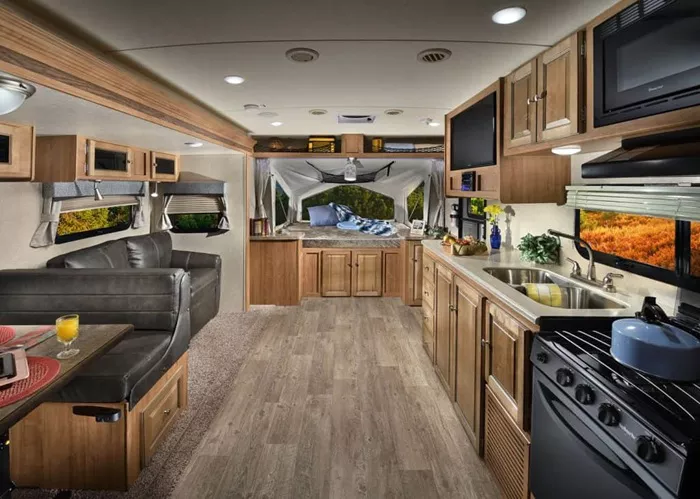A hybrid RV camper is a special type of recreational vehicle. It combines features from different RV types. This mix creates a versatile camping machine. Many campers love hybrids for their flexibility.
The word “hybrid” means a mix of two things. In RVs, it usually means combining:
- Hard-sided walls (like traditional trailers)
- Soft-sided pop-out sections (like tent trailers)
This blend offers the best of both worlds. You get more space than a small trailer. But it’s easier to tow than a big motorhome.
How Hybrid RVs Work
The Basic Design
Hybrid campers have a hard central body. This part contains the main living area. The sleeping areas often extend outward. These extensions use canvas or vinyl materials.
When parked, you “pop out” these sections. This creates extra room inside. The canvas walls breathe like a tent. But the hard center keeps things sturdy.
Power Systems
Most hybrids use two power sources:
- Battery power for lights and small devices
- Propane gas for fridge and heating
Some newer models add solar panels. These help keep batteries charged. A few even have hybrid engines (gas + electric).
Types of Hybrid RVs
Travel Trailer Hybrids
These are the most common. They:
- Tow behind vehicles
- Offer hard-sided living spaces
- Have pop-out beds
- Range from 15 to 30 feet long
Fifth Wheel Hybrids
These connect to truck beds. They:
- Provide more living space
- Often have multiple pop-outs
- Include residential-style amenities
Motorhome Hybrids
Less common but growing. These:
- Combine driving and living spaces
- May have slide-out rooms
- Often use hybrid engines
Benefits of Hybrid RV Camping
Easier Towing
The folded size is smaller. This means:
- Better fuel economy
- Easier parking
- Less wind resistance
More Living Space
When set up, hybrids offer:
- Separate sleeping areas
- Roomy interiors
- Outdoor-like feeling
Four-Season Options
Some models work year-round. Features include:
- Insulated canvas
- Heated mattresses
- Thermal windows
Cost Savings
Hybrids typically cost less than:
- Large motorhomes
- Full-size trailers
- Traditional RVs with slide-outs
Challenges of Hybrid RVs
Setup Time
You need to:
- Level the unit
- Extend stabilizers
- Pop out sections
- Secure all parts
This takes 10-30 minutes typically.
Canvas Maintenance
The soft parts require:
- Regular cleaning
- Occasional re-waterproofing
- Careful storage
Temperature Control
Canvas areas may:
- Get cold in winter
- Get hot in summer
- Transfer more noise
Key Features to Look For
Quality Canvas
Good materials will:
- Resist mold
- Block wind
- Last many seasons
Sturdy Mechanisms
The pop-out system should:
- Operate smoothly
- Lock securely
- Show no rust
Smart Storage
Look for:
- Outside compartments
- Under-bed space
- Creative cabinet designs
Modern Amenities
Many now offer:
- USB charging ports
- LED lighting
- Bluetooth speakers
Popular Hybrid RV Brands
Jayco
Known for:
- Durable construction
- Family-friendly layouts
- Good warranty
Forest River
Offers:
- Lightweight models
- Innovative designs
- Various price points
Coachmen
Features:
- Quality interiors
- Thoughtful storage
- Reliable systems
Choosing the Right Hybrid RV
Consider these factors:
Tow Vehicle Capacity
Check your:
- Vehicle’s tow rating
- Hitch type needed
- Braking system
Sleeping Needs
Count your:
- Regular campers
- Occasional guests
- Pet requirements
Camping Style
Think about:
- Frequency of use
- Typical destinations
- Hookup preferences
Maintenance Tips
Regular Cleaning
Wash:
- Canvas sections
- Exterior surfaces
- Interior fabrics
System Checks
Test:
- Pop-out mechanisms
- Electrical systems
- Plumbing (if equipped)
Proper Storage
Always:
- Dry completely before storing
- Remove food items
- Cover when not in use
The Future of Hybrid RVs
Technology Integration
Expect more:
- Solar power systems
- Smart controls
- Energy-efficient designs
Material Advances
New fabrics may offer:
- Better insulation
- Self-cleaning surfaces
- Longer lifespan
Eco-Friendly Options
Growing demand for:
- Sustainable materials
- Electric tow vehicles
- Waste management systems
Is a Hybrid RV Right for You?
Best For:
- Campers who want more space than a tent
- Families needing separate sleeping areas
- Travelers who move frequently
Less Ideal For:
- Full-time RV living
- Extreme weather camping
- Those who dislike setup work
Conclusion
Hybrid RV campers offer a smart middle ground. They blend the comforts of hard-sided RVs with the open-air feel of tent camping. While not perfect for every situation, they solve many common camping challenges.
The key is matching the RV to your needs. Consider how you camp, where you go, and what features matter most. With proper research, a hybrid could be your perfect camping companion.
Remember to:
- Inspect before buying
- Practice setup at home
- Maintain regularly
Happy camping in your hybrid RV! The open road and great outdoors await.
Related topics:
What is a Hybrid RV Camper? A Comprehensive Guide
Lightest Hybrid Camper: A Full Guide
What Is a Good Starter Camper?

